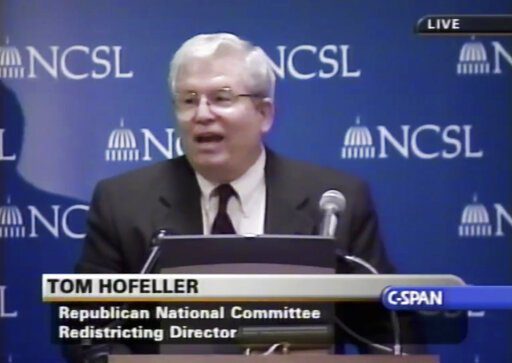
RALEIGH — Thousands of formerly confidential documents and emails that influenced the outcome of a partisan gerrymandering lawsuit have been made public. A judge has yet to decide whether others should stay confidential.
The documents and emails belonging to the late Thomas Hofeller were placed on a website over the weekend by his daughter, Stephanie Hofeller. Hofeller said she first discovered them while visiting her parents’ home in Raleigh shortly after her father’s death in August 2018.
Stephanie Hofeller was estranged both personally and politically from her father at the time of his death and was critical of his work. Last year, she contacted lawyers for the nonprofit organization Common Cause North Carolina to tell them about the documents.
The group, along with state Democrats, subpoenaed the files for use in a lawsuit that accused Republican lawmakers of illegal racial and partisan gerrymandering in the redrawing of state legislative districts.
A very small number of the documents were used by the lawyers; a state court put the rest under a confidentiality order. A Wake County judge ruled in November that more than 100,000 of the documents were no longer subject to the order because they were Thomas Hofeller’s individual work.
Attorneys, including one representing Hofeller’s business partner, are still fighting over which of the remaining files should stay secret. But Stephanie Hofeller, who was not subject to the order because she isn’t a party in the lawsuit, signaled weeks ago that she would be making many of the documents she obtained public.
“They belong to everybody, as they are evidence that concern The People, their right to franchise and their access to shared resources,” she wrote in a statement on the website.
Thomas Hofeller had a nearly 50-year career in redistricting and had worked extensively over the past decade on North Carolina maps that helped pad and retain Republican majorities in the General Assembly. Court rulings last year struck down dozens of North Carolina General Assembly districts.
The documents Stephanie Hofeller retrieved from external hard drives contain redistricting work her father did in several other states and also revealed his role in the Trump administration’s efforts to include a citizenship question on 2020 census forms. Courts also blocked the citizenship question for the census.
The files released on the website include statistics, tables, maps and other paperwork related to redistricting in North Carolina and other states: including Arizona, Missouri, New York, Texas and Virginia.
They also show extensive data collected on behalf of Republican lawyers defending a 2013 state law that narrowed voting access with provisions such as requiring a photo ID.
Asked whether the documents that appear on the website are the same as those held by Common Cause, a spokeswoman for the organization declined to comment Monday. A lawyer for Stephanie Hofeller, Tom Sparks, said he was confident that the files she uploaded are authentic.
State judges already have cited Hofeller’s previously released files as evidence that 2017 legislative districts pushed by North Carolina Republicans were designed to maximize GOP advantage by “drawing Democratic voters into districts where their votes would be diluted, and in many cases where their votes would not matter.”
In a 2019 deposition before the partisan gerrymandering trial, Stephanie Hofeller said she was looking for family photos at her parents’ house when she happened upon her father’s work and told Common Cause about it.
The uploaded documents contain photos, but also personal files and other sensitive material, including those related to Stephanie Hofeller. North Carolina GOP legislators had wanted a court to order the subpoenaed files destroyed, saying they were improperly obtained.
Hofeller wrote in her online statement that she decided to offer it all in part to prove its authenticity: “So, when it comes to myself, I have the right to sacrifice a certain amount of my own privacy.”



